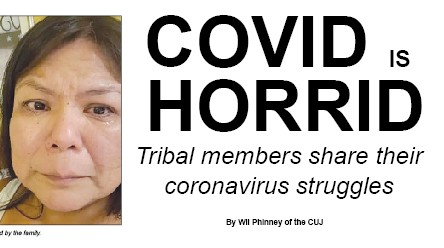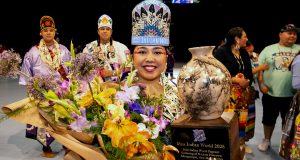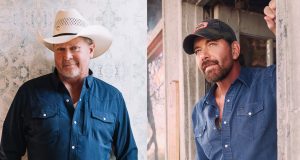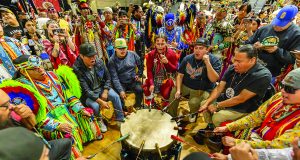By Wil Phinney of the CUJ
Frank and Nan Taylor suffer physically, emotionally
For Frank Taylor, COVID-19 “got real” when nurses in the intensive care unit at St. Anthony Hospital suggested he might want to get his affairs in order.
Frank is better, but for Nan Taylor, COVID-19 is still a nightmare. First it was a matter of life or death, then it became an emotional roller-coaster brought on by people who didn’t want to hear that they were exposed and wanted to be tested even less.
“This virus is a spirit, it brings out an ugliness I can’t explain,” Nan said.
Frank was exposed on Nov. 7 and learned about it three days later. It was Nov. 16 before Frank was tested at Yellowhawk Tribal Health Center. During that time, Nan said she and Frank and Thunder were not running around the community carelessly, but she’s heard those accusatory remarks from members of her community.
At the time of his test Frank had no symptoms, but took the test “to ease Nan’s mind.”
Little did he know.
Nan tested positive the day after Frank, which sent her into a frenzy because they were staying with her mother and grandmother. Fortunately, they tested negative.
Frank said he was sent home from Yellowhawk with an inhaler, but the next day he couldn’t breathe so he drove himself to the Emergency Room at St. Anthony Hospital.
“They said ‘you got COVID, nothing we can do.”
The next day Nan called the paramedics to a hotel in Pendleton where they had moved to quarantine.
Frank asked for a chest X-ray that revealed he had pneumonia. He was admitted to the hospital, spending five of his six days in Intensive Care Unit.
His temperature bounced around from 102 to 105. His oxygen levels were into the 80’s. He was in pain trying to breathe.
In the ICU, nurses hooked him to a ventilator or respirator. He was given Rendesivir by IV.
Things got worse when his lungs began to fill with fluid.
He was scared when nurses, moving him to the ICU, told him if he wasn’t breathing better they might have to put him in a coma and ship him to another hospital.
“They asked me if I had plans in case something went south and I couldn’t breathe on my own. They wanted to know if I’d taken measures to have my wife speak for me. I called Nan and told her if anything happens and there’s a chance to save my life I want to do that. That’s when it got real.”
Nan remembers that conversation.
“We did discuss the ‘what if.’ We talked about what to do if the virus took a turn on both of us … It was scary but we didn’t want to part ways without a plan. We reached out to family and asked them who would be the best choice to take our son. I was promised by my sister that Thunder would not leave the family if anything happened to us.”
Frank said he never thought he’d contract COVID-19. He thought he had the sniffles from working outside on the mountain. After all, he said, “You see people with it that are able to stay home the whole time and not have symptoms.”
That was Nan. Hardly a symptom as far as she was concerned. Shallow breathing that felt like a band around her chest. Her heart was fluttering and she had a “massive” headache.
Even so, she tried to focus her attention elsewhere.
“My body was so strung out on making sure Frank and Thunder were okay. I knew I had to check their temperatures. I’d lay down and pop back up every two hours. I wanted to make sure it wasn’t taking over, on Thunder especially.”
The night Frank was diagnosed Nan heard an unfamiliar wind through the windows. She walked over to Frank on the couch and “when I touched him he was burning up.”
But he couldn’t stop his teeth from chattering.
“He had a fever of 104.3 and was freezing.”
Frank was sick physically. Nan was sick emotionally.
In quarantine at a Pendleton hotel, Nan wore her heart on her sleeve posting often on Facebook.
And, in addition to helping her husband and son, Nan admittedly became overwhelmed by the idea of the illness.
“It’s a very dark sickness,” Nan said. “At nighttime it became scary. I knew I needed to rest my body, but the doctor told Frank I didn’t have time to sleep. It was constant terror. You wake up and realize you have the deadliest disease in the world.”
And as if the sickness wasn’t bad enough, she found out people in her own community were shunning others who had tested positive.
“How are we going to heal as a community when everybody is blaming and pointing fingers? This has affected my life, my grandmother’s life, my mother’s life, my husband and son’s life. What I dealt with was horrific for me.”
After her test, Nan began telling people that she knew she’d been around that that they should get tested.
Nan knew where she contracted the virus and who she’d been around. When Yellowhawk’s contract tracers asked her for names she told them.
“I decided not to let any name slide that I came into contact with. That’s what I did. I tested and when the contract tracer asked I gave them names.”
Nan said “it was like pulling teeth to get people to get tested. If was very hard to make people listen that we were exposed. Denial and this sickness are very real. Nobody shows symptoms for days and they don’t think they have COVID.”
Nan turned over names of several people who did not want to be part of the testing after Frank was diagnosed.
She gave Yellowhawk a dozen names; 11 tested positive for COVID.
Nan said she has to be careful with her words because naming names hasn’t gone over well with everybody on the list.
Some people just “brushed it off,” but others were offended, which put Nan on the defensive.
“No one was taking it seriously. Not even my grandmother. When she saw me wearing a mask she asked ‘Where’s your faith?’ I told her I’d been exposed and then I cried.”
The first two days after Frank was tested were dreadful and Nan didn’t know who to turn to.
“I’ve never witnessed so much frustration, even dealing with my husband,” she said, calling it a form of Post Traumatic Syndrome Disorder (PTSD).
It was a constant state of worry, Nan said. She busied herself sanitizing “from the toilet to the doorknobs.”
She had questions but couldn’t find anyone to answer them.
“Do I call 911 emergency? I call the ER and they send you to a COVID hotline but nobody’s there. You feel like you’re on your own until you need life-saving measures.”
Nan did call an ambulance on the first night in the hotel.
“I was already in a state of ‘what the hell?”
That uncomfortable feeling was captured in one of the photos Nan has posted on Facebook.
“I wouldn’t wish this on my worst enemy,” she said.
Nan said she was thankful for all the support she received from family, friends, even strangers who commented on her posts.
One of her friends in California sent Nan 500 disposable masks that she intends to distribute to elders and people at high risk.
Since they’ve come home after isolation they’ve been able to use CARES Act funding through the Confederated Tribes’ Incident Command Team to replace everything.
While stuck in her hotel room, Nan focused on her son and social media.
One of her Facebook posts received nearly 2,000 likes and more than 200 shares.
“I don’t know why I turned to Facebook but I did. I wanted to send a message out to people. We do what we do, we take care of the land. It’s not going to come to a stop, but it’s not going to last forever. For a short while there are sacrifices we have to make.”
Since they’ve come home after isolation they’ve been able to use CARES Act funding to replace everything.
“From our bedding, pillows to tooth brushes. We invested more in cleaning supplies, threw out old furniture and carpeting, and replaced some clothing. We wipe doors down from the entrance to the bathroom.”
Nan said she knows many people don’t want to know they are sick.
She said she understands.
“It’s very unfortunate our cultural ways have had to come to a halt, What happened over at the Patrick home [Toby Patrick gathering at Easter in April, which resulted in 17 citations that still have not gone to Tribal Court] was unfortunate, but they really could have had an explosion … At first I was angry with this virus, I was angry at the leadership for not believing our ways, I was angry for the people getting persecuted. It’s taken my own lesson to understand.”
It’s been made abundantly clear that not everyone is sympathetic to Nan’s plight, or at least the way she’s dealt with it.
“A lot of people don’t even want the world to know they are sick,” Nan said. “I mean people are running around without symptoms and they are spreading it because they don’t think they have it.”
But even those who contract COVID-19 can’t be complacent.
No matter what, Frank and Nan agree, don’t get comfortable.
Frank remembers when a nurse wheeled him out the back door of the hospital.
“She (nurse) said, ‘You’re a survivor of COVID, but don’t think you can’t catch it again.”
Nan said this sickness and its aftermath have not been easy to deal with.
“The support has dwindled away,” Nan said. “We’re frowned upon now because people fear this sickness. We were not reckless, but this is what people think when you get COVID-19.”
Nan said she decided to “bite the bullet” to get the message out.
“I just don’t want to be attacked by people for being transparent and honest. I didn’t ask to get this sickness.”
Nan said COVID-19 has been “a lot overwhelming,” but she’s trying to see a little brighter side.
“We wear our masks to protect the ones we love,” she said. “This pandemic has hit lives around the world; it is our duty to take care of one another. Us as Indian people have fought everything that has been brought to our lands and we’ve made it through together … We are all human. We make mistakes. Some we can’t take back. Prayers up my people.”
Father, daughter ‘bond’ in hotel quarantine
David Garcia wasn’t especially excited about attending a birthday party on the Columbia River near Clackamas back in September.
“I didn’t really want to go,” he said. “I don’t watch the media but I knew a lot of people were freaking out.”
What started as a small gathering turned into what Garcia said was “at least 50, maybe a hundred” people.
“And somebody there didn’t bother to tell a sole he had it,” Garcia said.
Garcia wasn’t feeling sick but he immediately decided to get a test “just out of concern.”
“I want to protect my family at all costs.”
The first test was negative, but not long after he felt the “precautionary” need to get a second. It, too, was negative.
Then he began to get symptoms, especially a bad headache. He went to Oregon Health Sciences and University for a third test that came back positive on Sept. 11.
In the days that followed, his 5-year-old daughter, Jaishoni Minthorn, tested positive.
The quarantined together for 21 days in a hotel open only for people who had contracted COVID-19.
Garcia spent his days keeping Jaishoni occupied, watching movies and playing made-up games. He even let her cut his hair.
At nights, though, he stayed awake and watched his little girl breathe.
Garcia said the time he spent bonding with his daughter in the hotel “changed my life.”
Jaishoni didn’t get sick, but her dad did.
“For a week and a half it was terrible. I was wheezing and it felt like my lungs were collapsing,” Garcia said.
Garcia said he “felt like a goner, burning up.”
Harder yet, he said, was being away from the rest of his family.
“Mentally that’s really hard, terribly hard. Nobody should have to go through that.”
And Garcia, 40, didn’t think he would.
“Before I’d go to the gym and stay safe, wear a mask, wash my hands a lot, but we’re fighting something we can’t see,” he said.
Soon enough, Garcia was learning what people think about the coronavirus.
He tried to contact as many people as he could, but found many of them didn’t seem to want to know.
“People think we don’t have to talk about this, but we have to if we’re going to shut it down.”
Garcia said he knows some people “feel ashamed or scared of what people think,” but that was the last thing on his mind.
“If I survived I wanted to save somebody,” he said.
For some people he knows, denial is a “pride thing.”
“The don’t want their image effected, but you have to talk to your family because it’s something that has to be addressed. I would be hard for me to go that route. I don’t want anybody else to do through this.”
Garcia was thankful for the financial help he received from the CTUIR. The hotel was paid for by NARA, and NAYA workers dropped off cleaning supplies as well as sage and sweet grass. A friend, Jason Umtuch, gave Garcia a $250 grocery card. He told Umtuch that “my son’s mom is freaking and he sent her a food card too.”
While in quarantine, Garcia prayed.
“I did a lot of praying and one night something woke me up twice. Somebody was singing to me. It was a game changer, telling me I was going to be okay. A lot of my fears and worries went away.”
Family of four tests positive, but Dad gets it bad
Daniel Red Elk “put two and two together” and realized he had COVID-19.
After experiencing a “weird headache,” he went Nov. 18 to Yellowhawk Tribal Health Center for a COVID-19 test. He tested positive and so did his partner, Ginella Thompson.
A few days later Red Elk’s children – Aiyana 12 and Kendal 9 – also tested positive.
“It was more than a severe migraine,” Red Elk said. “For the first few days it was like somebody constantly squeezing my brain, making my brain ooze out. That’s how bad the headaches were.”
They stayed for a day at his mom’s house before they were sent to a hotel in Pendleton to quarantine.
For a couple of days Red Elk was nauseated. He couldn’t eat or drink. Then he became disoriented.
“I was getting dizzy walking from the bed to the bathroom.”
For the next day and a half, “my lungs felt like they were on fire. I had a hard time breathing. I tried drinking water and tried to be active, but it was a killer pretty much. It hurt like a son of a (expletive).”
Thompson had it worse. She stayed in bed for six days unable to eat or drink. On day seven of the quarantine, inflammation on her lungs sent her to St. Anthony Hospital. She received IV fluids and nurses “forced her to eat” before she was released.
Over time, they both got better.
“I was taking Tylenol, musinex and drinking lots of water. It helped, and then the following week, close to the quarantine date, I noticed I was getting my taste back and was able to eat. I could walk without getting dizzy.”
Red Elk thinks everyone should take notice.
“I’m healthy as an ox and was playing it safe. I masked up, washed my hands, stayed my distance. I was scared and frustrated. It was scary because I was in bed for a couple of days and not sure I was going to be able to get out again.”
Some people, Red Elk said, are in denial. They are angry about the virus.
“I’m thinking some folks are maybe too ashamed to talk about it, how you contracted it, where you got it from.
Other folks are pretty much rebels who don’t want to wear a mask. They say the virus is nothing but the flu. I’ve had to explain to people that COVID is not a joke. It almost killed me and my partner.”
Red Elk said people should not be ashamed.
He’s 22 and healthy and still contracted the coronavirus
“I’m as healthy as I can be. I ear right. Bu this virus does not care if you’re healthy or sick or not. It still finds a way to get to you. It’s like ‘Hey I’m here what are you going to do about it?’”
Red Elk’s message is simple.
“Take the virus seriously. It’s real. It’s not a joke. It attacks the elderly, middle age, young adults and children,” he said.
He told the “young rebels and daredevils” who aren’t following the guidelines “please, please, please take this serious. I almost lost my life because of this.”
Parents plus five of six children test positive for virus
Since she left the Reservation for Portland four years ago, Twila Jones has stopped drinking and using. She bought a house with her partner in Estacada. She was reunited with all five of her children, who range in age from 4 to 18.
She was working as a parent-support specialist at NARA’s youth residential treatment center in Gresham and going to school part-time at Portland Community College, studying to be an addiction counselor.
Then COVID-19 showed up at the door.
On Nov. 16, Twila’s throat started itching and her husband, David Ramirez, thought he had a cold from working construction in the rain.
Twila’s intuition took over.
“That night I put David in isolation and the next day I called for COVID tests … there’s an uncertainty of not knowing, but I wasn’t going to risk it,” Twila said.
Twila, David and five of the six children tested positive. Only Lucy, the oldest, didn’t contract the coronavirus and that’s likely because she’d left with her father before the rest of the family had been tested.
But when the tests came back, NARA’s COVID team acted immediately. Employees and their families were tested. Clackamas and Multnomah counties started tracing people who had been in contact with family members.
Twila was most worried about 7-year-old David who has suffered with pneumonia in the past.
Coughs were suppressed and temperatures controlled with over-the-counter medicines, but Twila turned to traditional medicines, too.
“I smudged and smudged and was in constant prayer. I kept it like a sweathouse in here,” Twila said during a phone interview. “We were drinking cuch-cush and cedar tea all day long.”
The children, who were mostly a-symptomatic, couldn’t use a fast-acting spray that cooled and numbed the adults’ throats.
Instead, “I kept sneaking little pieces of bitterroot to them and told them to chew on it.”
She didn’t worry that they wouldn’t like the taste because they’d all lost their sense of smell and taste by then.
“Everybody was down for the first three days. We just layed there, but you have to keep turning, like a rotisserie chicken, so it doesn’t sit in your lungs.”
While the family was quarantined, they received food boxes from Clackamas County and the Salvation Army. The NARA food pantry hooked them up with food and juice, as well as cleaning supplies.
Twila is adamant that people who test positive for COVID-19 share that unwelcome news with people they’ve been around.
“You have to be able to speak up if you have it. If you’ve been around someone for 15 minutes or longer, just make it known. It’s better for you and your family to get tested.”
Twila said her family is sticking with Gov. Brown’s COVID-19 protocols, including gatherings, even in your own house, of no more than six people.
“Stay home, wear a mask, wash all day long. You could be standing in line at the grocery store and the next thing you know you catch COVID.”
Twila blames Coyote, the trickster, for allowing people to believe they can be safe at pool tournaments and birthday parties.
“I tell my kids it’s all Coyote. They say they want to go to a birthday party and I say I don’t care, there will be a birthday next year. Don’t be fooled by Coyote.”
Twila said she thought she was safe.
“Sanitizers, spray, bacterial wipes. Washing our hands. We were safe and we still got it,” she said.
On Thanksgiving Day, Twila said, the family sat down for dinner.
“We had a lot to be thankful for.”




